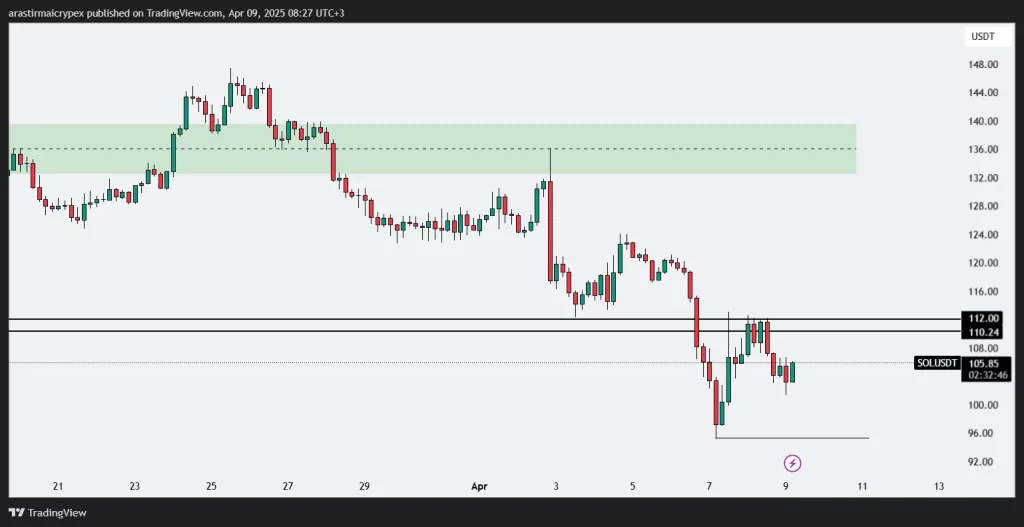Trump’s 104% Customs Duty Move to China – Ripple Buys Hidden Road for $1.25 Billion
Trump’s 104% Customs Duty Move to China
US President Donald Trump confirmed that a total of 104% customs duty will be imposed on China. This decision also includes an additional 50% duty that will come into effect if China retaliates. While the White House emphasized Trump’s determination with the words “steel will”, China responded harshly by saying “we will fight until the end”. The new duties are applied at different rates depending on the country, in addition to the 10% global duties imposed last week. A 20% duty is being imposed on the EU, a 26% duty on India and a 49% duty on Cambodia.
This development, which caused fluctuations in global markets, pushed many countries to seek an agreement with the US, while further straining relations with China. Trump said, “Many countries want to make an agreement, but China doesn’t know where to start.” Treasury Secretary Scott Bessent stated that China’s retaliatory capacity is limited. These developments have reinforced the potential for the trade war to threaten global growth and financial stability.
Ripple to Acquire Hidden Road for $1.25 Billion
Ripple has announced that it will acquire multi-asset prime broker Hidden Road for $1.25 billion. The deal is one of the largest acquisitions in the digital asset sector and aims to expand Ripple’s institutional solutions and the use of its stablecoin RLUSD. Hidden Road has an annual trading volume of more than $3 trillion across FX, derivatives, fixed income securities, and crypto assets.
Ripple plans to bridge the gap between traditional and digital asset markets with Hidden Road’s post-trade operations, which will be ported to XRP Ledger. The company aims to support institutional DeFi solutions by positioning the RLUSD stablecoin as prime broker collateral. The acquisition will be completed in the coming months following the necessary regulatory approvals.
US Puts the Brakes on Crypto Investigations and NCET Shuts Down
The US Department of Justice has dissolved the National Cryptocurrency Enforcement Team (NCET), which was established in 2022 to combat cryptocurrency crimes. The decision was announced as part of a radical transformation of the Trump administration’s regulatory approach to digital assets. Under the new policy, investigations will focus only on crypto activities linked to drug cartels, terrorist organizations and similar serious crimes.
Deputy Secretary Todd Blanche described the Biden-era strategy of “regulating crypto through prosecution” as “irresponsible” and announced the new directive based on Trump’s executive order. From now on, lawsuits based on regulatory violations against wallet services, exchange platforms and privacy-enabled “mixers” will be requested to be dropped. The SEC and other regulators are also seen easing their crypto crackdown in a similar manner.
FDIC’s Open Blockchain and Stablecoin Move for Banks
The US Federal Deposit Insurance Corporation (FDIC) is preparing to regulate banks’ relationship with crypto with clearer and more flexible rules. FDIC Chairman Travis Hill stated that completely banning open and permissionless blockchains would be too restrictive. The agency plans to create appropriate security mechanisms for banks to use such networks in a controlled manner. At the same time, issues such as whether tokenized deposits and stablecoin reserves will be subject to deposit insurance are also under evaluation.
The FDIC has also withdrawn the reporting requirement for banks’ digital asset activities and announced that it will provide more guidance in the future. The aim is to enable banks to use innovative technologies in a secure framework while preserving the stability of the financial system. Risks such as stablecoins, smart contracts, and automatic cash outflows in the event of bankruptcy are among the areas the agency plans to address with technical solutions.
SEC Stablecoin Disagreement Could Complicate Regulation
U.S. Securities and Exchange Commission (SEC) member Caroline Crenshaw’s opposition to the agency’s statement that stablecoins are not securities could make it harder for new regulations to be enacted. According to TD Cowen, the disagreement represents a new hurdle for stablecoin legislation advancing in Congress.
The SEC recently issued a statement saying that reserve-backed stablecoins are not securities. However, Crenshaw argued that this approach overly underestimates stablecoin risks and harms investors. The legislation would require Democratic support to pass, with some Democrats in Congress concerned that the regulations could pave the way for figures like Elon Musk to launch their own stablecoins.
Ark Invest Continues Coinbase Acquisition
Ark Invest, run by Cathie Wood, purchased $4.8 million worth of Coinbase (COIN) shares on Tuesday through three separate exchange-traded funds (ETFs). The purchase follows the firm’s $13.3 million investment in Coinbase on Monday. With the latest transactions, Coinbase has become one of the largest holdings in the ARKK, ARKW and ARKF funds. COIN shares, which are the third-largest position in ARKK at 7.31 percent, reflect the company’s confidence in Coinbase.
The investments came just before President Donald Trump’s tariffs on U.S. trading partners, especially China, went into effect. Despite the sell-off in global markets and the decline in Coinbase shares, Ark Invest’s increase in position drew attention. COIN shares lost 3.69 percent on Tuesday, while the crypto market remained under pressure.
Argentine Congress Launches Investigation Into LIBRA Crypto Scandal
The Argentine Congress approved the establishment of a special commission to investigate government officials after the LIBRA meme coin crashed in February. The Solana-based LIBRA token, introduced by President Javier Milei himself, reached a market value of $ 4.5 billion in a short time, but fell by more than 90% on February 14-15, causing major losses for investors. It is stated that approximately 75 thousand wallet owners have suffered a total loss of $250 million.
The commission, which will be established in line with the decision accepted by 128 votes, will call high-level officials, including Economy Minister Luis Caputo and Justice Minister Mariano Cúneo Libarona, to testify. Milei, who argued that the LIBRA project was a private initiative, quickly deleted the promotional post and claimed that he did not know the details of the project. The investigation, which is being carried out by both Congress and the judiciary, is investigating possible connections between Milei and the developers. LIBRA points to the second crypto crisis after the CoinX scandal, in which Milei was sued by investors in 2022.
Vote-Buying Scandal in Arbitrum
The latest vote-buying case in the Arbitrum ecosystem has raised serious questions about the reliability of the DAO governance model. A user named Hitmonlee.eth was able to manipulate approximately $6.5 million worth of governance weight by purchasing 19.3 million ARB voting power for just 5 ETH. This transaction, which was made through the LobbyFi platform for a critical position such as a transparency committee member, showed that the system can be abused for ideological rather than financial reasons.
This incident highlights how easily a one-vote-per-token system can be manipulated. In a similar case at the Compound DAO, a major token holder was able to transfer $24 million to his own protocol. The proliferation of vote rentals through platforms is enabling low-cost governance attacks in DAOs. This situation can jeopardize the long-term sustainability of DAOs by prioritizing individual gain over community interests.
Solana Brings Privacy and Compliance Together
Solana developers aim to hide users’ transaction details while maintaining regulatory compliance with their new privacy tools under the name “Confidential Balances”. Using homomorphic encryption and zero-knowledge proofs (ZKP), this system allows sensitive data such as transfers, mints, burns, and transaction fees to be verified without being publicly disclosed. The Rust-based infrastructure is already in the testing phase, and browser and mobile wallet integrations with JavaScript-supported ZK libraries are planned in the coming period.
The “auditor key” feature integrated into the system allows regulators to access transaction details, making it possible to fulfill legal obligations such as AML and CTF. However, the use of these audit keys is completely optional and can be configured specifically for the institution. Thus, Solana introduces both user privacy and institutional control, ushering in the era of “compliant privacy” on the blockchain.
———————————————————————————————
BITCOIN (BTC)
BTC is trading at $76,600 as of the morning hours, gaining 0.30% in value. It is clearly observed that the downward trend continues. Although there is an effort to hold on above the 76,600 level, the general outlook is negative. As long as it remains below the 80,000 level, pressure may continue. While 73,029 stands out as the main support level below, panic sales may be triggered if this level is broken. In a possible upward recovery, the first resistance is the 79,500 – 80,000 band.
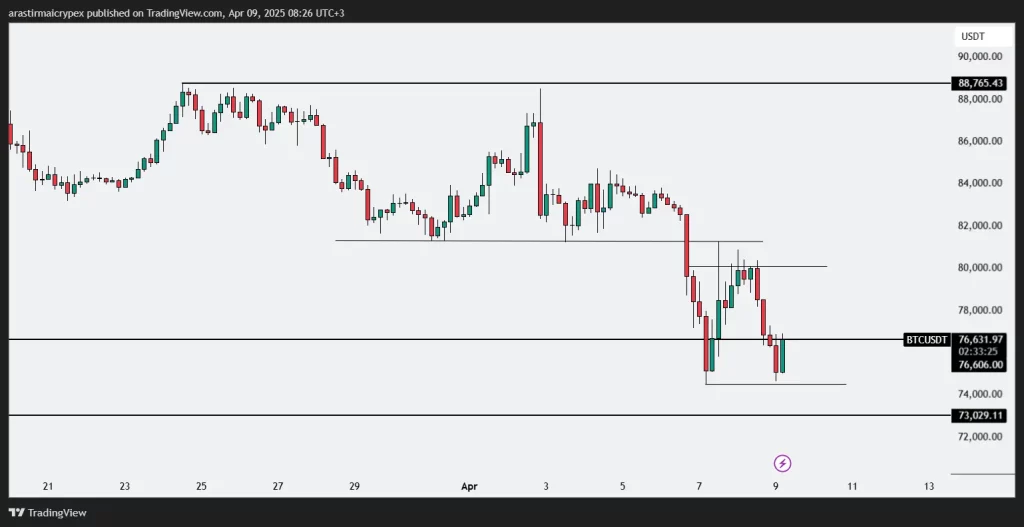
ETHEREUM (ETH)
ETH is priced at $ 1460 with a 0.92% loss in value as of the morning hours. It has experienced a strong sell-off from the major resistance zone between 1.768 – 1.853 and has retreated to 1.450 levels. The 1.520 – 1.630 band marked with the purple box is first a support, now a resistance. As the price settles below this zone, a seller scenario comes to the fore. Closing below 1,450 may trigger a decline towards the 1,350 – 1,370 region on the ETH side.
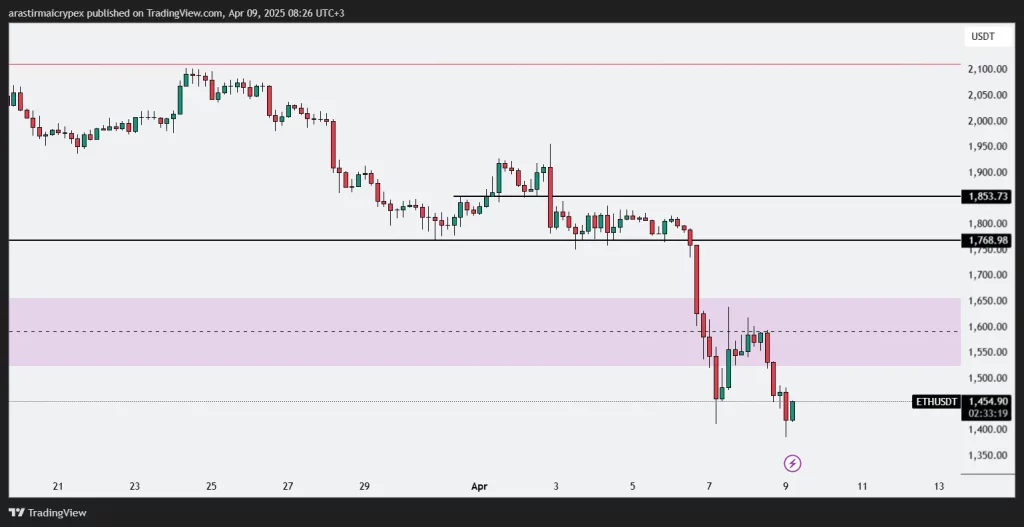
RIPPLE (XRP)
XRP is trading at $ 1,807 with a 0.76% gain as of the morning hours. The 1.85 – 1.92 zone marked in blue works as a liquidity and resistance zone. After testing this area, the price has encountered selling pressure. The bottom level around 1.70 is currently being monitored as support. Closing below this area could carry the selling wave to 1.60 levels. Above, closing above 1.92 can only bring the positive scenario back to the agenda.
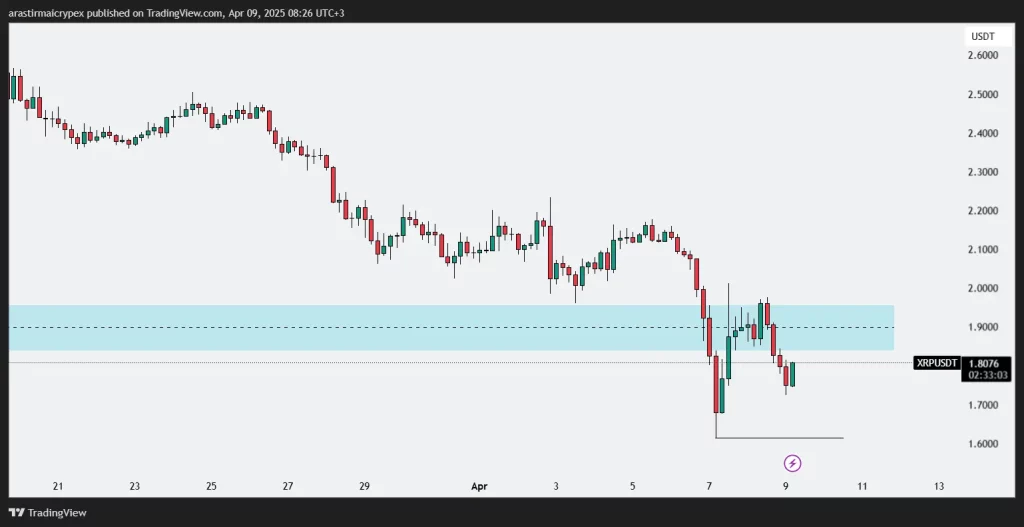
AVALANCHE (AVAX)
AVAX is trading at $16.59 with a 2.72% increase in value as of the morning hours. It is seen that the price has been clearly rejected from the 17.74 resistance and reacted from the 15.27 support. There is a horizontal consolidation between these two levels. While the 16.47 level can be followed as short-term support, the rejection zone at 17.00 above is a short-term barrier for the price. As long as the 17.74 level is not exceeded, buyers should be cautious. If 15.27 is broken below, 14.00 levels may be on the agenda.
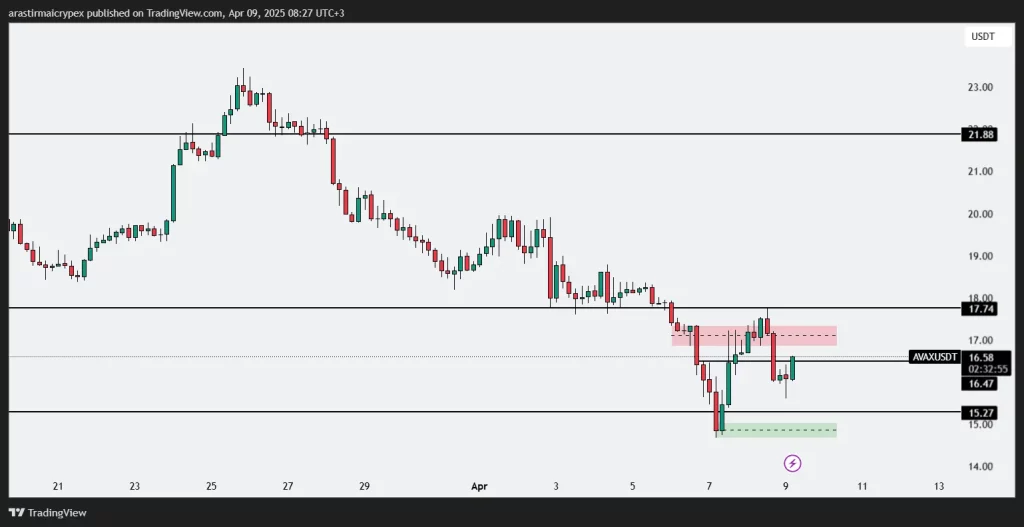
SOLANA (SOL)
SOL is traded at $105.6 levels with a 0.21% increase in value as of the morning hours. It is seen that the price maintains its long-term falling structure. The 110.24 – 112.00 region stands out as a short-term important supply region, and it is observed that the price was rejected after reaching this region. Below, the 96.00 levels have worked as support. In the current situation, the price seems to be stuck between this support and resistance. If the 96.00 level is broken, deepening selling pressure can be expected. Above, unless the 112 level is exceeded, selling pressure may continue in the direction of the continuation of the trend.
